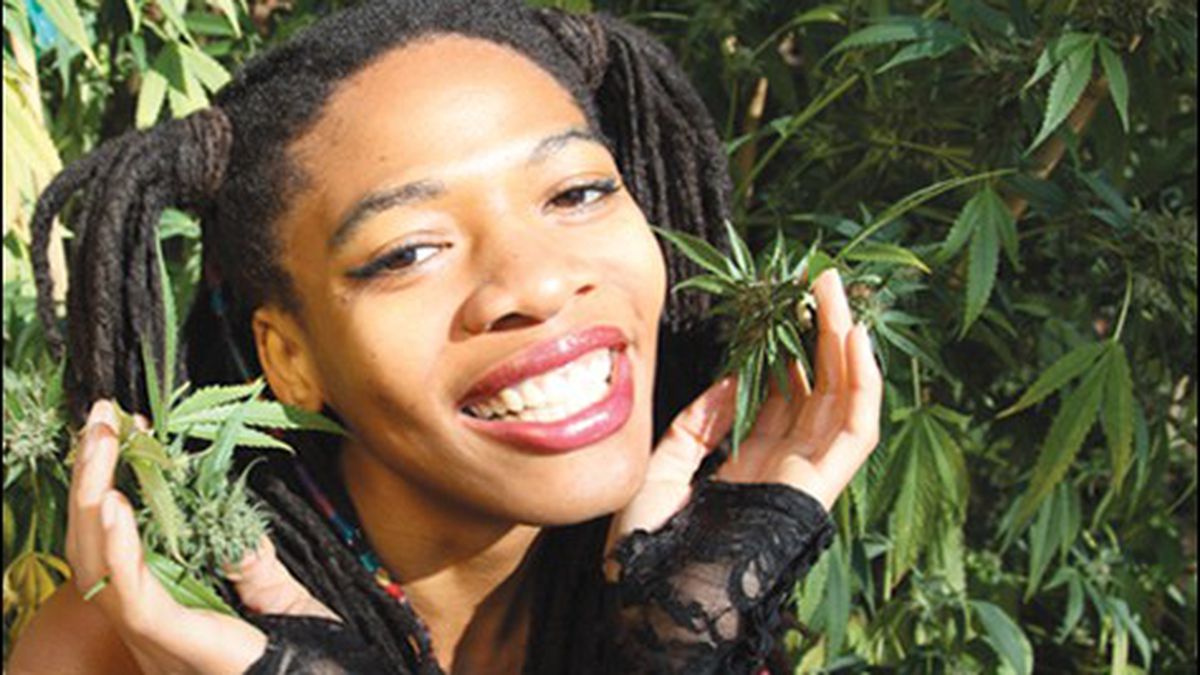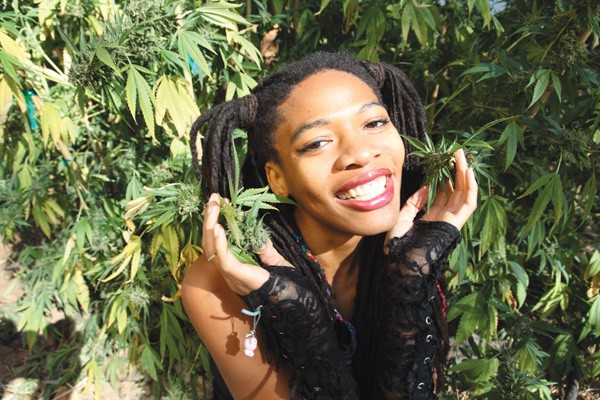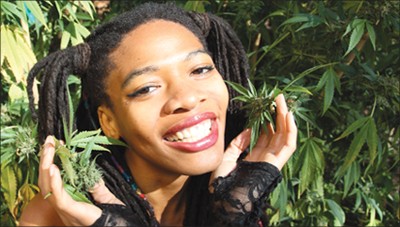Jennifer Soares came out of the closet on April 17, 2010, but not in a gay way. She’s a drug lawyer against legalization.
Sitting on a legal panel at the International Cannabis & Hemp Expo at the Cow Palace, Soares was asked by an audience member her thoughts about Proposition 19, the Regulate, Control and Tax Cannabis Act of 2010, which will appear on the ballot November 2. With the pungent smell of pot wafting through the endless rows of booths advertising everything from hemp clothing to THC lollipops, Soares nervously spoke into the microphone.


Credits: Doug Boehm 
Dragonfly de la Luz is a self-proclaimed stoner against Prop 19. 
Some foes of Prop 19 erroneously claim that it will allow big tobacco companies to enter the market, and have created satirical cigarette company ads to make their point. In reality, federal interstate commerce laws prevent that, according to Richard Lee and NORML. 
“All I can say is, you guys should read the proposition and make your own decision,” she told the crowd of hippies, burners, and industry ilk. “Don’t listen to what everybody else has to say. You should read it yourself.”
Soares expected her comment to be followed by boos. But it wasn’t. Then fellow panelist and noted reformer Bill Panzer added that he wasn’t especially fond of Prop 19, either. “That made me feel a little bit more comfortable so I said a couple more things,” Soares recalled. “I was very hesitant at first to come out openly against Prop 19, because it’s sort of this thing like, ‘How can you be pro-legalization but anti-Prop 19? It doesn’t make sense?'”
However, the boos started online shortly thereafter. According to Soares, “it just skyrocketed immediately after that.”
The lawyer began getting scathing calls at her office. In the wired world of drug law reform, she’s become a bit infamous, and the next time she spoke out publicly — at Dr. Greenthumb & Tommy Chong’s Spring Gathering in San Bernardino on May 8 — the boos in the crowd were audible.
Though Soares says she does not smoke weed herself, she’s part of a group of fringe cannabis activists, growers, dispensary owners, and casual stoners who have aligned with cops, big business, and anti-gay marriage conservatives to denounce the most sweeping attempt at legalizing marijuana in California in thirty years. On the radical left, personal unhappiness with Prop 19 recently boiled over into fiery rhetoric containing lies traditionally told by law enforcement. The debate has crossed the line into physical threats against these so-called “Stoners Against Legalization.” And their “no” vote could send the close race down in defeat.
From its inception, Proposition 19, the Regulate, Control and Tax Cannabis Act of 2010, was contentious among reformers. If passed, it would treat cannabis similar to how society treats alcohol. That means it would be regulated and taxed. It would also end California’s Wild West days of growing pot. Under Prop 19, only adults over 21 could possess and grow a limited amount of cannabis for personal use. They could not give it to those under 21. Smoking marijuana in public or around kids would be forbidden. Furthermore, counties in the state would be able to opt in or opt out of allowing the commercial cultivation and sale of cannabis.
Started by hemp-activist-turned-Oakland-educator Richard Lee, Prop 19 began with a split from more hard-line reformers in the Bay Area. The proposition was the subject of focus groups and tested in polls to attract a majority vote in California, said Lee, sitting in the third-floor lobby of his Oaksterdam University in downtown Oakland. That meant it had to appeal to swing voters like soccer moms who are concerned with keeping drugs away from their kids. Those moms are unhappy that pot is easier to get than alcohol, and would vote for controlling it.
But Lee’s centrist plan did not please famed older radicals like Dennis Peron and the late “Hemperor” Jack Herer, who wanted maximum legalization with minimum government involvement. At their most extreme, radical reformers want to throw open the jails and prisons, and grant pardons to all marijuana drug offenders. They want no restriction on giving marijuana to kids and few limits on possession, cultivation, and sales.
Meanwhile, what might be called the mainstream drug law reform community, groups like NORML and the Drug Policy Alliance, has had its own problems with Tax Cannabis 2010. Still smarting from an expensive defeat in 2008 over the Proposition 5 “rehab not jail” initiative, they told Lee not to press forward in 2010. Midterm voters tend to be more conservative, they said. Lee should wait until 2012, when the Obama re-election vote could drive turnout on a legalization initiative.
But Lee liked his odds in 2010. The recession makes California’s expensive drug policy less tenable by the day. The Great Depression helped ended alcohol prohibition, he said, and the Great Recession could help end pot prohibition. So Lee pulled $1.4 million out of his Oakland businesses to get enough signatures to place Prop 19 on the ballot. Since then, the entire world has been watching the race, and while mainstream drug law reformers have kept their money out, they’re vocally supporting him.
The fringe, however, has different ideas.
Soares represents medical marijuana dispensary owners in Southern California, where she often faces a very hostile environment from local cities and counties. While medical marijuana has flourished in Northern California, places like Anaheim, San Diego, and Irvine have banned dispensaries and continue to fight them in court. It’s this heated environment that has turned Soares against Prop 19. Because Prop 19 allows cities and counties to opt in or opt out of commercial sales, she says people in “dry” counties like Orange have no reason to vote for it, because they have nothing to gain. She wants the state to mandate commercial sales of pot in such conservative hotbeds.
“In Southern California, the mindset is ‘Prop 19 is not going to happen for us,'” Soares said. “The mindset of the dispensary owner down here is, ‘We’ll just stay medical, because we’re not going to be able to do recreational anyway.'”
Lee says he had to allow counties to opt in or out in order to skirt federal drug laws. But he might’ve failed to fully grasp the Southern California mindset.
Dispensary owners down south are like beaten dogs, loathe to provoke their master, according to Soares. The prospect of recreational use makes Southern California clubs fearful of renewed crackdowns on medical usage and more vigorous DEA raids.
“It’s not just Southern California that’s having issues with medical marijuana,” she said. “Recreational is not going to be any better.”
Lee says places like San Diego should change policy at the ballot box through local voter initiatives of their own. “Just because the local county supervisor is an asshole doesn’t mean they don’t have the votes,” he said. “If they can collect signatures, it’s easy. So local activists have to get busy and do it.”
But Soares speaks to an even bigger psychic divide that’s more ancient: the ongoing rivalry between Northern and Southern California. She speculates that the north’s lax policies will create a climate where Los Angeles is beholden to Oakland for its pot needs. Since Lee is from there, he will profit off the restrictive climate down south.
“For me, it’s great Oakland is going to have a measure for them, but they are pushing it on the rest of the state,” said Soares. “I just don’t think that this proposition is written good enough for the rest of the state to help Oakland out.”
There have even been news reports that growers in Northern California are worried about the consequences Prop 19 might have on their economy. But Berkeley Patient’s Care Collective manager Erik Miller, who deals with growers all the time, says he thinks most of them are in favor of the proposition. “I’ve noticed that the news likes to put people on from Humboldt that claim they’re against it because the region could lose money, but I think that’s a minority of people that are selfish,” he said. “Obviously I haven’t conducted a poll, but maybe 90 percent are in favor of it. Having some protections so people aren’t being carted off is worth it, even if the price drops a little bit. Our medicine should be cheaper anyway, shouldn’t it?”
The Humboldt Medical Marijuana Advisory Panel, which represents some local growers, distributors, and other cannabis services, is also supporting Prop 19. HUMMAP Secretary Charley Custer said he’s not seeing critical growers hitting the streets or handing out literature. Most are for change, even if it’s incremental. “We’re all going to be voting for it, with various reservations, some more than others,” he said. “The strongest criticism I’ve seen happened at our forum. The youngsters are furious this thing embalms sanctions against a 22-year-old giving a joint to a 19-year-old in the State of California’s constitution. But that provision is almost impossible to enforce or indeed to prevent.”
For Soares, Prop 19 amounts to not enough change. But some of her peers want much, much more.
Dragonfly de la Luz, a San Francisco-based cannabis and travel writer for Skunk Magazine, says “the universe” gave her her name a couple years back. But the Internet made Dragonfly a name thanks to her blog titled “Stoners Against the Prop 19 Tax Cannabis Initiative.”
First posted in July alongside photos of the dreadlocked woman hitting a three foot-long joint, her screed has been widely circulated and reposted since then. She has 78 comments on her site, and plenty of haters across the ‘net. On the political spectrum of left to right, Dragonfly represents the point where the radical legalization left falls off the edge of the map and into political oblivion.
Chasing an endless summer around the globe while smoking weed, Dragonfly says when she first heard of Prop 19 last year, she was stoked. But then she read it.
“I’m like, ‘Is this what legalization looks like?’ I just don’t think this was what Peter Tosh had in mind when he implored us to legalize it.”
Her thousand-word criticism of Prop 19 boils down to two main issues: It doesn’t go far enough, and Prop 19 represents “the corporatization” of cannabis.
She notes that even though about 61,000 Californians are arrested for marijuana crimes each year, that number will not drop to zero on November 3. Those under 21 without a medical marijuana card can still be arrested, and adults who give weed to those under 21 can also get in trouble with the law. So can unlicensed dealers.
“We should be able to buy our cannabis wherever we want,” said Dragonfly. “We’re not forced to only buy our alcohol from Safeway.” Lee says regulation of sales is the whole point, as opposed to the “anything goes” environment currently on the streets.
But Dragonfly’s biggest problem seems to be Lee himself and what he represents to her and other radical reformers. “This proposition wasn’t written by activists; it was written by businessmen,” she said. “Its aim is the corporatization of cannabis. This might be our last chance to stop it.”
Actually, Lee used to be a stage-lighting tech for Aerosmith and started out as an activist with a hemp store in Texas. He’s taught more than 10,000 people how to grow cannabis and open dispensaries through his Oaksterdam University. He was instrumental in passing several drug law reform measures in Oakland.
Dragonfly erroneously says growers who want to legally cultivate will have to pay $211,000 a year to do so. “Obviously there’s no space for the mom-and-pop small-time farmer who have been living off marijuana legally since 1996.”
But only Oakland has considered charging $211,000 for a large-scale cultivation permit, and the city would still allow rather large personal grows (32 square-feet, or no more than 72 plants, and 3 pounds of dried processed medical cannabis) without a permit. Prop 19 also allows for individuals to grow for personal use. Furthermore, an independent RAND Corporation study concluded that cities that erect stiff barriers to entry for commercial growers and cultivators could be undercut by cities that don’t, creating a competitive growing climate statewide.
Dragonfly says she’s aligned with Prop 215 activist Dennis Peron, who also has come out against Prop 19. Peron has said publicly that he should be allowed to give pot to kids without fear of legal repercussion. Dragonfly and Peron support a different ballot initiative that failed to get enough signatures in 2009 called the Herer Initiative, named after Herer, who died this year. Its 2012 prospects are also politically dead in the water.
The so-called Herer Initiative calls for throwing open the jail and prison gates and pardoning all drug offenders. It would allow people to possess twelve pounds of pot, and limits taxation to $10 per ounce rather that Prop 19’s suggested $50. It caps the cost of a commercial license at $1,000 and states no tax revenue could go to law enforcement.
Even Soares believes there is no way the Herer Initiative would pass. And the family of Jack Herer has also asked people like Dragonfly to stop using his name.
“Jack ‘wanted it all’ and Prop 19 is just part of that dream,” wrote son Dan Herer in a letter to members of the cannabis community. “Unfortunately Jack passed away before Prop 19 made the 2010 ballot; so many people think he would still oppose it. We don’t believe that, and we ask that everyone stop saying he would cling to that position as we move toward the Nov. 2 vote. He was smart and had the political savvy to know that once a measure is on the ballot, the time for bickering has passed. That is why he campaigned for Prop 215 despite its shortcomings. That is why, were he able, he would now be telling voters to rally around and Vote Yes on Prop 19.”
Dragonfly wants to end prohibition without mainstream regimes like taxation, regulation, and business, but at least she tries to back up her point of view. Some of her peers are proving just as capable of outright lies as Prop 19’s standard enemies on the right.
Sitting in the audience at Soares’ coming-out panel was a shadowy group of around ten medical cannabis users who have launched an anonymous attack web site called Stop19.com. The site clearly indicates a need to put down the bong.
The site says “the Prop 19 Cartel” has large-scale growing permits in Oakland. The only problem is, Oakland has not issued large-scale cultivation permits to anyone.
The site also erroneously claims, “large tobacco companies have purchased land and strain trademarks in anticipation of Prop 19 passing. Nothing will stop tobacco companies from supplying low-quality cannabis laced with additives at any price they choose.”
Actually, federal interstate commerce laws prevent tobacco companies from entering the market, according to Lee and NORML. “Getting involved in California marijuana would poison them,” said Dale Gieringer, spokesperson for California NORML.
“It’s all urban myth,” Lee added. “None of it is true. They call me a crazy, insane millionaire, but I spent it. Politics is an expensive habit. Lee says he drives a ’97 Pontiac Bonneville and has lived in a one-bedroom apartment near Lake Merritt for ten years.
Stop19.com uses a domain-by-proxy company to hide the identity of its owners, and has a disclaimer on its site saying none of the contents can be considered true. Reached via e-mail, Stop19 said “Our anonymity has no bearing on the facts.” And “Just about every web site on the Internet has a standard ‘we don’t make warranties on the accuracy’ disclaimer.”
A recent Sacramento Bee/Field Poll indicated that the race for Prop 19 is close. While 47 percent of respondents want to regulate pot like alcohol, 4 percent want to “legalize marijuana so it can be purchased and used by anyone.” Could that 4 percent be the swing vote that sends Prop 19 down in defeat?
Soares says widespread support from all mainstream reformers like NORML and even groups like the NAACP and various California unions may neutralize the far lefts. “That has to help,” she said.
Dragonfly de la Luz hopes Prop 19 loses, and says the mainstream drug law reformers are locked in groupthink and gripped by fear. “They feel that now that the momentum is building we can’t go against it now because it would hurt the movement in some way or fragment the movement,” she said. “I’m hopeful that it doesn’t win and it’s not that I’m anti-legalization. Obviously I’m pro-legalization, but apparently being pro-legalization and being pro-Prop 19 are two different things entirely.”
NORML’s Gieringer — the group that coined the phrase “Stoners Against Legalization” — said there’s always been a fringe community of stoners who vote against reform measures. “Every vote counts, but we’re talking about a minority of a minority,” he said. “People currently using marijuana are voting 85 percent for Prop 19.”
The fringe won’t matter as much in the Prop 19 race as Republican gubernatorial candidate Meg Whitman‘s massive, multimillion-dollar get-out-the-vote campaign this fall, says Gieringer.
Whether or not Prop 19 wins or loses, Lee has said his main goal was to get the discussion going on legalization. It’s clear that quite a bit of discussion — crazy and sane — is taking place. From that perspective, Soares says Lee has already won.
“Oh absolutely,” she said. “I think the best part of Prop 19 and one of the benefits I see is that it’s getting national coverage. Glenn Beck is talking about it. If you can get him to say crazy stuff about anything you’ve done well.”

















